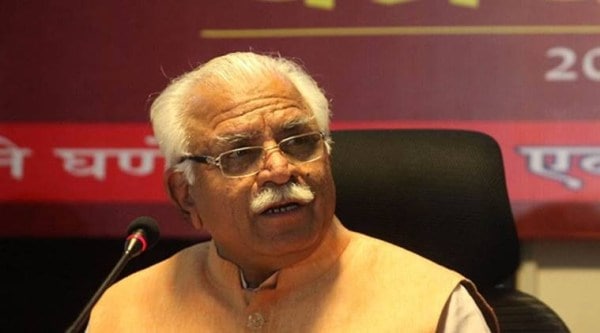 The CM said new schemes are being implemented to minimise the dependence of farmers on arhtiyas. (File)
The CM said new schemes are being implemented to minimise the dependence of farmers on arhtiyas. (File)
Haryana Chief Minister Manohar Lal Khattar on Sunday said that schemes are being formulated to ensure that farmers can sell their produce as traders, be it through FPOs or under their own brand.
“All new initiatives taken by the central government and the state government during the last six years are in the interest of farmers. With these two new ordinances, a farmer can sell his produce not only in his state but also in the mandis of other states. Thus, under the contract farming, he can enter into an e- agreement with any person or bank for his farm produce. Besides, now he will not be required to mortgage his land with the bank for the crop loan,” Khattar said. He was speaking on two new ordinances – Farmers’ Produce Trade and Commerce (Promotion and Facilitation) Ordinance and Farmers (Empowerment and Protection) Agreement on Price Assurance and Farm Services Ordinance, 2020 — introduced by the Union government.
“In the Rs 20 lakh crore economic package announced by the Central government recently, Rs 1 lakh crore has been kept for agricultural infrastructure, including warehouses and agro-based industries. Schemes are being chalked out to ensure that farmers of Haryana get the maximum benefit from this package,” Khattar said. “The state government has decided to hire 17,000 Kisan Mitras, who will voluntarily advise the farmers on effective utilisation of land and assist in better financial management.”
The CM said that steps were being taken to realise Prime Minister Narendra Modi’s vision of doubling the farmers’ income by 2022. “For the last two years, minimum support price (MSP) is declared before the sowing of crops,” he said, adding that with this, the farmer can make up his mind in advance to sow the crop accordingly. Though the government would continue buying the crop in the mandis at MSP, in case the farmer gets price more than the MSP outside the mandis, then he can also sell his crop at a higher price. The gap in the price of crop would be compensated under the Bhavantar Bharpayee Yojana.
The CM announced that 2,000 retail outlets would soon be opened in villages and cities through the cooperation department, in which the youth of the village and town will work according to their abilities and skills. He said that these outlets will function as mini-super markets. Apart from this, potable mineral water under brand name ‘Haryana Fresh’ is also being launched through the Public Health Engineering Department.
Khattar said some people had opposed Mera Pani Meri Virasat Scheme in the beginning which aims at water conservation so that the future generations do not suffer. “Government had targeted sowing other water-efficient crops in place of paddy in one lakh hectare area. The farmers understood the importance of the scheme and have so far made registrations for 1,18,128 hectare area on Meri Fasal-Mera Byora portal for sowing alternative crops in place of paddy,” he said. “Similarly, with a view to ensuring that Soil Health Cards are available to the farmers close by, water and soil testing would be done in the laboratories in schools and colleges. Soil health cards will be issued every three years for 70 lakh acres of area in the state so that the farmers are aware of the fertility of their land and can sow the crops accordingly.”
“In the last few days, connections have been issued for 13,000 to 14,000 agriculture pump sets in the state. Farmers could also purchase motor up to 10 Hp. If the farmers have deposited the security with the power corporations, it would be returned to them along with the interest. Similarly, the Pashu Credit Card scheme has been implemented on the pattern of Kisan Credit Card and 1,40,000 cattle rearers have so far filled forms under the scheme,” he said.
The CM said new schemes are being implemented to minimise the dependence of farmers on arhtiyas.